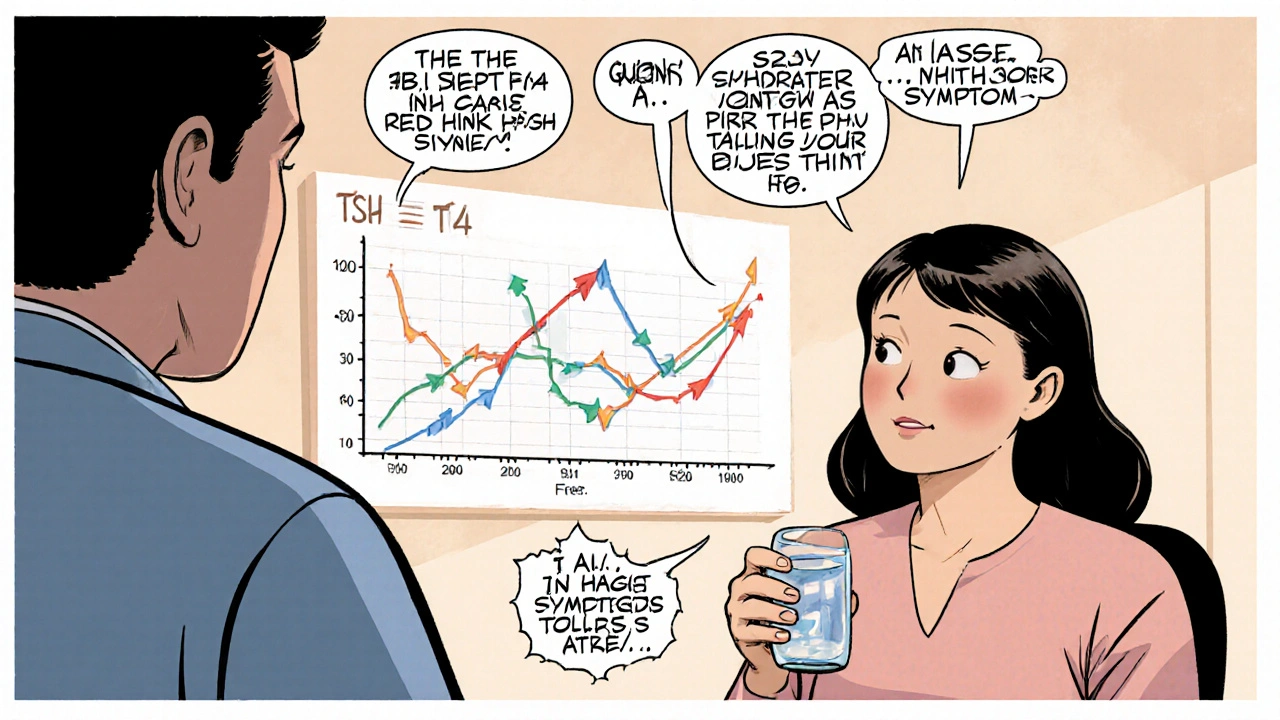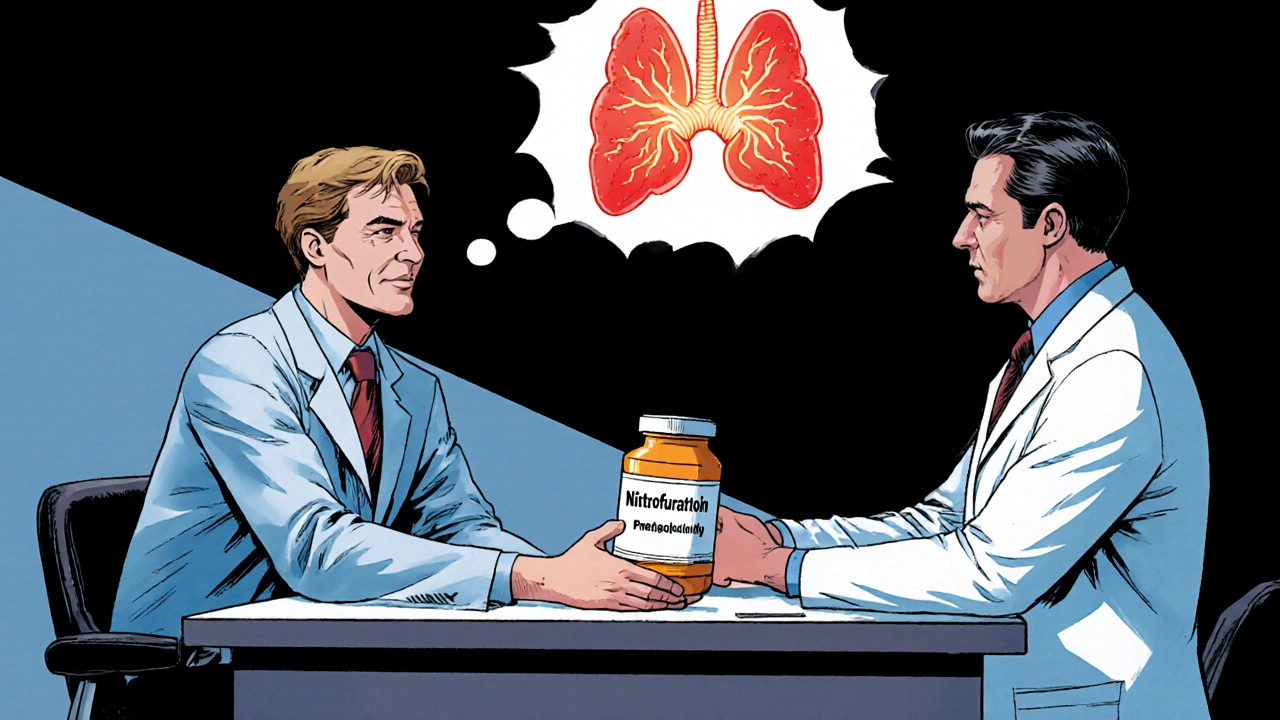Nitrofurantoin Thyroid Risk Calculator
This tool helps assess your risk of developing thyroid issues when taking nitrofurantoin for a urinary tract infection (UTI). Based on the article content, certain factors increase your risk.
Your Information
How It Works
This tool calculates your risk based on factors mentioned in the article:
- Existing thyroid disease (2 points)
- Renal impairment (1 point)
- Iodine deficiency (1 point)
- Family history of autoimmune thyroid disorders (1 point)
- Current thyroid medication (1 point)
Total points: 0
When you’re prescribed nitrofurantoin for a urinary tract infection (UTI), the last thing on your mind is whether the drug could affect your thyroid. Yet reports of thyroid dysfunction linked to this antibiotic have sparked plenty of questions. This guide breaks down what nitrofurantoin does, how it might influence thyroid health, who should watch out, and what steps you can take to stay safe.
Key Takeaways
- Nitrofurantoin is a narrow‑spectrum antibiotic primarily used for uncomplicated UTIs.
- Rare cases of drug‑induced thyroiditis and altered thyroid hormone levels have been documented.
- Patients with pre‑existing thyroid disease, renal impairment, or iodine deficiency are at higher risk.
- Monitoring thyroid function tests (TSH, Free T4) before and during treatment can catch problems early.
- If symptoms arise-fatigue, weight changes, palpitations-talk to your prescriber about alternative antibiotics or additional testing.
What Is Nitrofurantoin?
Nitrofurantoin is a synthetic nitrofuran antibiotic that works by inhibiting bacterial enzymes involved in carbohydrate metabolism, ultimately damaging bacterial DNA. It is marketed under brand names such as Macrobid and Macrodantin and is FDA‑approved for the treatment of uncomplicated lower urinary tract infections caused by Escherichia coli, Enterococcus spp., and Staphylococcus saprophyticus. Because it concentrates in urine and has minimal systemic exposure, clinicians value it for its low impact on gut flora.
Brief Overview of Thyroid Disorders
Thyroid disorders refer to a spectrum of conditions where the thyroid gland produces too much (hyperthyroidism) or too little (hypothyroidism) thyroid hormone, or where the gland is inflamed (thyroiditis). Common forms include Graves' disease, Hashimoto's thyroiditis, and iodine‑deficiency goiter. Thyroid hormones (T3, T4) regulate metabolism, heart rate, temperature, and brain development, making any disruption potentially serious.
How Nitrofurantoin Could Affect the Thyroid
Most of the evidence comes from case reports and pharmacovigilance databases, rather than large‑scale trials. The proposed mechanisms include:
- Immune‑mediated thyroiditis: Nitrofurantoin may act as a hapten, triggering an autoimmune response that inflames the thyroid (similar to drug‑induced lupus).
- Iodine interaction: The drug can increase urinary iodine loss, worsening deficiency in people already low on iodine.
- Renal clearance dependence: Because nitrofurantoin is eliminated by the kidneys, reduced creatinine clearance leads to higher systemic levels, potentially exposing the thyroid to greater drug concentrations.
These pathways are rare, but they explain why clinicians sometimes see abnormal TSH or transient thyrotoxic episodes after a nitrofurantoin course.

Who Is Most at Risk?
- Existing thyroid disease: Patients on levothyroxine for hypothyroidism or antithyroid drugs for hyperthyroidism may experience dosing fluctuations.
- Renal impairment: A creatinine clearance (CrCl) below 60mL/min reduces drug clearance, raising systemic exposure.
- Iodine deficiency: Populations with low dietary iodine (e.g., some remote regions of New Zealand) are more vulnerable to iodine‑related thyroid issues.
- Autoimmune predisposition: Individuals with a family history of Hashimoto's or Graves' disease may have a heightened immune response.
Monitoring Thyroid Function During Treatment
For most healthy adults, routine thyroid testing isn’t necessary. However, for the at‑risk groups listed above, consider the following protocol:
- Baseline TSH and Free T4 before starting nitrofurantoin.
- Repeat TSH 2-3weeks after initiating therapy if the course extends beyond 7days.
- If TSH rises >5µIU/mL or Free T4 drops below the reference range, discuss dose adjustment of thyroid medication or switching antibiotics.
- After completing nitrofurantoin, re‑check thyroid labs after 4weeks to ensure values return to baseline.
Alternative Antibiotics for Concerned Patients
If you fall into a high‑risk category, your prescriber might choose a different UTI drug that has less renal dependence. Common alternatives include:
- Trimethoprim‑sulfamethoxazole (TMP‑SMX) - effective but avoided in patients with sulfa allergy.
- Fosfomycin - a single‑dose option with minimal systemic absorption.
- Cephalexin - a first‑generation cephalosporin suitable for many uncomplicated UTIs.

Practical Tips for Patients
- Stay hydrated - increased urine output helps clear nitrofurantoin faster.
- Take the medication with food or milk to reduce gastrointestinal upset.
- Inform your pharmacist and doctor about any thyroid medication you’re using.
- Watch for symptoms of thyroid imbalance: unexplained weight change, heat or cold intolerance, rapid heartbeat, or persistent fatigue.
- Keep a copy of your lab results and share them with any new prescriber.
Summary Table: Nitrofurantoin vs. Common UTI Antibiotics
| Antibiotic | Primary Indication | Renal Clearance | Known Thyroid Impact |
|---|---|---|---|
| Nitrofurantoin | Uncomplicated lower UTIs | High - requires adequate CrCl | Rare drug‑induced thyroiditis, iodine loss |
| Trimethoprim‑SMX | UTIs, respiratory infections | Moderate - metabolized hepatically | None reported |
| Fosfomycin | UTIs (single dose) | Low - minimal systemic exposure | None reported |
| Cephalexin | UTIs, skin infections | Renal & hepatic | None reported |
Frequently Asked Questions
Frequently Asked Questions
Can nitrofurantoin cause permanent thyroid damage?
Most reported cases are reversible once the drug is stopped. Permanent damage is extremely rare and usually linked to an underlying autoimmune condition that was unmasked by the medication.
Do I need to stop my levothyroxine if I start nitrofurantoin?
Not automatically. Have your doctor check TSH after a week of treatment. If levels shift, a temporary dose adjustment might be needed, but stopping levothyroxine outright is not recommended.
Is there a test to predict who will develop thyroid issues from nitrofurantoin?
No specific genetic or biomarker test exists. Risk assessment relies on medical history-especially existing thyroid disease, renal function, and iodine status.
How long after finishing nitrofurantoin can thyroid symptoms appear?
Symptoms can emerge during therapy or up to 4 weeks after the last dose, reflecting the time needed for hormonal changes to become clinically evident.
Should I avoid nitrofurantoin if I live in an iodine‑deficient area?
Consider discussing alternative antibiotics with your doctor, especially if you have a known thyroid condition. Ensuring adequate dietary iodine (e.g., dairy, seafood, iodized salt) can also reduce risk.








16 comments
Alexis Howard
Nitrofurantoin won’t magically mess with your thyroid.
Darryl Gates
Hey there, thanks for sharing this thorough guide.
The way you laid out the risk factors makes it easy to spot who should stay vigilant.
I especially like the practical tips about staying hydrated and monitoring symptoms.
It’s great to see the emphasis on baseline labs before starting therapy.
Keep up the solid work, it really helps patients feel more informed.
Kevin Adams
Behold, the silent drama that unfolds when a humble antibiotic dares to tango with the thyroid gland!
In the grand theater of medicine, nitrofurantoin is the understudy who occasionally steps into the spotlight of unintended consequences.
One might ask whether the drug is a villain or merely a misunderstood protagonist.
The case reports whisper like conspiratorial poets, hinting at immune‑mediated thyroiditis that erupts without warning.
It is as if the molecule dons the mask of a hapten, provoking the body's own defenders to turn on the gland.
This autoimmune masquerade mirrors the tragic arcs of drug‑induced lupus, a tale as old as pharmacology itself.
Yet, the narrative does not end there; the drug also siphons iodine away, leaving the thyroid gasping for its essential fuel.
In regions starved of iodine, the impact is magnified, a silent storm brewing beneath the surface.
Renal impairment adds another twist, allowing nitrofurantoin to linger, its concentration swelling like a tide against a weakened shore.
The resulting hormonal chaos can manifest as fleeting thyrotoxicosis or subtle hypothyroidism, each a fleeting cameo in the patient’s story.
Clinicians, as vigilant directors, must cue the baseline TSH and free T4 tests before the curtain rises.
If the script calls for a prolonged course, a mid‑act check at two to three weeks can catch the plot twist before it derails the performance.
Should the labs betray an upward TSH, a temporary dose adjustment of levothyroxine may restore harmony.
And when the final bow is taken, a follow‑up after four weeks ensures the thyroid returns to its rightful rhythm.
Thus, the saga of nitrofurantoin and the thyroid is not a horror tale, but a reminder that even the most modest actors can influence the grand production of endocrine health.
Katie Henry
Esteemed readers, allow me to commend the author for a meticulously crafted exposition.
The integration of pharmacologic mechanisms with endocrine physiology is both enlightening and reassuring.
Your practical advice-hydration, meal timing, and symptom vigilance-empowers patients to take proactive steps.
The recommendation to monitor thyroid function in high‑risk cohorts demonstrates clinical prudence.
May this guide serve as a beacon for informed therapeutic decisions.
Joanna Mensch
While the guide appears comprehensive, one cannot ignore the hidden agendas of pharmaceutical corporations.
They subtly downplay the frequency of drug‑induced thyroiditis, hoping the public remains oblivious.
Consider the possibility that larger epidemiological studies are being suppressed to protect profit margins.
Staying skeptical and demanding transparent data is essential for true safety.
The system is designed to keep us in the dark.
RJ Samuel
Honestly, I think the whole thyroid scare is overblown-most folks won’t notice anything unless they’re already on thyroid meds.
It’s a classic case of medical over‑caution, turning a low‑risk antibiotic into a villain.
Sure, watch the labs if you have a pre‑existing condition, but for the average person, nitrofurantoin is just another pill.
Patricia Echegaray
Don’t be fooled by that complacent nonsense! Our government’s health agencies are colluding with drug manufacturers to hide the real dangers.
They want us to swallow pills without questioning the hidden endocrine sabotage that could weaken our nation’s vigor.
We must demand alternatives and protect our bodies from this covert assault.
lisa howard
Let me take a moment to unpack the cascade of implications that arise when we discuss nitrofurantoin’s impact on thyroid health.
First, the pharmacokinetic profile of the drug highlights its reliance on renal clearance, which in turn introduces variability in systemic exposure among patients with differing glomerular filtration rates.
Second, the immunogenic potential of nitrofurantoin, acting as a hapten, can precipitate an autoimmune thyroiditis that may be transient yet clinically significant.
Third, the iodine‑loss mechanism is particularly insidious in populations already teetering on the brink of deficiency, amplifying the risk of hormonal imbalance.
Furthermore, clinicians must weigh the benefits of a targeted urinary antibiotic against the backdrop of these nuanced endocrine considerations.
In practice, this translates to a judicious selection of patients for whom the drug’s advantages outweigh the speculative risks.
Monitoring protocols-baseline TSH, follow‑up at two weeks, and post‑therapy reassessment-serve as safeguards against unforeseen derangements.
Lastly, patient education plays a pivotal role; informing individuals about symptom vigilance empowers them to seek timely intervention.
All things considered, nitrofurantoin remains a valuable tool, but its use demands a tailored, evidence‑informed approach.
Cindy Thomas
Wow, you really think those lab checks are enough? 🤔 In reality, the hidden cascade starts much earlier and most doctors don’t even bother to mention it. 😒
James Falcone
We need to protect our own healthcare system from foreign drug influences-use home‑grown alternatives.
Frank Diaz
The argument for national self‑reliance overlooks the pharmacological realities. While patriotism is admirable, nitrofurantoin’s efficacy and safety profile are established through rigorous international research. Dismissing it outright compromises patient care. A balanced perspective acknowledges both the benefits and the nuanced risks discussed in the guide.
Mary Davies
I’ve been looking into the connection between UTIs and thyroid health, and this article really opened my eyes.
The way it breaks down the immune‑mediated mechanisms makes the whole thing feel less abstract.
I’m especially intrigued by the role of iodine loss-who would have thought a urinary drug could affect dietary mineral balance?
It also raises questions about how many other common medications might have hidden endocrine effects.
Do we need more routine screening for patients on long‑term antibiotics?
Overall, the piece is a great springboard for deeper investigation.
Valerie Vanderghote
Building on that curiosity, it’s worth noting that the interplay between renal function and drug metabolism is a cornerstone of personalized medicine.
If a patient’s creatinine clearance dips below the recommended threshold, the systemic exposure to nitrofurantoin can rise dramatically, potentially tipping the scales toward thyroid disruption.
Moreover, the genetic predisposition to autoimmune thyroiditis adds another layer of complexity-family history should factor into prescribing decisions.
Clinicians might also consider prophylactic iodine supplementation for at‑risk individuals, though evidence remains limited.
In practice, a comprehensive medication review that includes endocrine considerations could preempt adverse outcomes.
Thus, the seemingly simple act of treating a UTI becomes a nuanced decision matrix, intertwining nephrology, endocrinology, and pharmacology.
Michael Dalrymple
Thank you for this well‑structured overview; it elegantly synthesizes pharmacology with endocrine vigilance.
The recommendation to tailor monitoring based on renal function and pre‑existing thyroid disease reflects sound clinical reasoning.
By presenting alternative antibiotics alongside nitrofurantoin, you empower clinicians to make individualized choices.
This balanced approach aligns with the principles of evidence‑based medicine and patient‑centered care.
Emily (Emma) Majerus
Great summary-love the practical tips, totally helpful.
Virginia Dominguez Gonzales
What an inspiring read! Your clear breakdown of risks and actionable steps truly equips patients to navigate their treatment journeys.
The emphasis on staying hydrated, monitoring symptoms, and consulting healthcare providers resonates deeply.
Keep shining a light on these important connections between antibiotics and thyroid health.